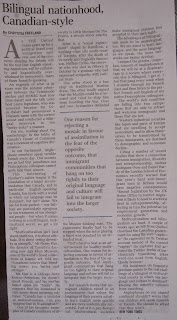The advantages of bilingualism seem to be neurological, too. We are wired to learn languages, and the more languages we speak, the more networks our brains develop.A friend has told me many times that he cannot lead worship nor a prayer meeting in Chinese. Truth be told, he does speak Chinese, probably a lot better than I, but having to lead a group is another story. (I have often wondered if he just does not want to help me!)
(The Straits Times, 29 December 2014)
After reading this article about multiculturalism and Canada's bilingual policy, I am greatly encouraged to know that my brain is not going to slow down any time soon. Constantly keeping up with the languages I already speak, and trying to learn Vietnamese, helps keep my brain networks active. My friend +Lloyd Estrada just made a public declaration that he will be learning Burmese this year. He already speaks three languages fluently. His last language acquisition is Spanish, which he learned so well that he had a blog and could preach in it too! I am very sure he will do well in Burmese, although it will be an uphill task first trying to learn the writing system.
In this fast-paced and stressful world, we tend to forget things very easily. We have tech gadgets to help us, but our brain functions end up slowing down. One good way to keep those brain networks developing is to learn a language. The benefits will outweigh the sweat and tears in the beginning.
Cheers to 2015! Happy language learning!



